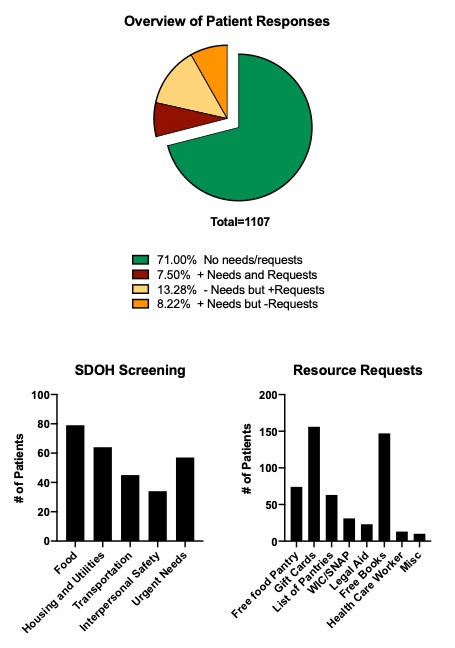Health Equity/Social Determinants of Health
Session: Health Equity/Social Determinants of Health 7
298 - Leading with Resources: Addressing Social Determinants of Health Directly in Addition to Screening
Sunday, May 5, 2024
3:30 PM - 6:00 PM ET
Poster Number: 298
Publication Number: 298.2042
Publication Number: 298.2042
- MA
Maria Ansar, MD-PhD (she/her/hers)
Pediatric Resident
University of North Carolina
Chapel Hill, North Carolina, United States
Presenting Author(s)
Background: Screening for social determinants of health (SDOH) remains a standard practice in pediatric care. However, many families may desire resources but not feel comfortable disclosing food insecurity, housing insecurity, lack of utilities, transportation difficulties, and interpersonal violence.
Objective: The aims of this study are to determine 1) the prevalence of food insecurity, housing security, and other SDOH parameters, 2) which resources are most commonly requested, 3) the discrepancy between positive screening compared to requests made for resources, and 4) quantity of food resources utilized when directly available.
Design/Methods: As part of routine pediatric care, families fill out a form containing validated food, housing, utilities, transportation, and interpersonal safety screening questions. The form also has a list of available resources on and off-site that can be provided if requested. Data from these forms was compiled from August 2022 – August 2023. Interventions were developed based on previous patient qualitative data. The clinic also placed a food pantry in the hallway from which families can take food resources without clinic staff involvement, to maximize family choice, dignity, and autonomy.
Results: A total of 1107 forms were collected during August 2022 – August 2023. In the screening portion, a significant portion of families identified food insecurity (7.1%, n=79), housing insecurity (5.8%, n=64), transportation concerns (4.1%, n=45), and interpersonal safety concerns (3.1%, n=34). On a menu of resources, the most frequently requested included gift cards for groceries (14.1%, n=156), free books (13.3%, n=147), and free food from an on-site pantry (6.7%, n=74). In addition, 13.3% (n=147) families had SDOH requests despite screening negative in comparison to 7.5% (n=83) families that screened positive and made requests. An estimated 4000 food items were removed by families from the pantry over this period.
Conclusion(s): Many families request resources despite screening negative for unmet SDOH, suggesting screening alone is insufficient to meet need. Patients most frequently request food and book support. In response, our clinic increased referral food options and opened a free book shelf in the waiting room, with more than 1300 donated books. SDOH are a vital component to the health of pediatric patients and with worsening disparities post-pandemic and expiration of emergency benefits in March 2023 these gaps will likely worsen. Leading with resources directly allows patients to maintain dignity and autonomy in meeting their own needs and work toward closing these gaps.

